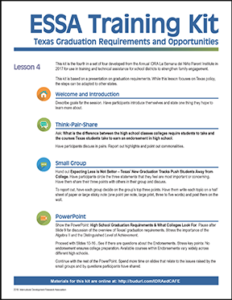• Aurelio M. Montemayor, M.Ed. • IDRA Newsletter • April 2018 •
In the summer of 2013, the Texas Legislature weakened the graduation requirements for Texas students. Schools are now encouraged to put students in different paths, called “endorsements,” toward graduation: some college bound and some bound for jobs that don’t require college preparation. This phenomenon is present in different guises all across the United States. Colleges and universities do not pay much attention to the endorsement (or track) of high school students. Rather, they examine the transcript for the courses and grades: math, science, social studies and English, as key examples.
 This month, IDRA is releasing the fourth in a set of toolkits developed from the Annual IDRA La Semana del Niño Parent Institute in 2017 for use in training and technical assistance for school districts to strengthen family engagement. The aim of this assistance module is to inform the families on how to best counsel and guide their children, especially those in middle and high school. This workshop and these materials are very specifically for those families whose children are not perceived to merit a path to college. Parents don’t need to know the content of pre-Calculus or chemistry to insist to the counselor or teacher that their child be enrolled in those classes or that, if a course seems too difficult for a student, that the teacher and the school offer other support for achieving in that subject.
This month, IDRA is releasing the fourth in a set of toolkits developed from the Annual IDRA La Semana del Niño Parent Institute in 2017 for use in training and technical assistance for school districts to strengthen family engagement. The aim of this assistance module is to inform the families on how to best counsel and guide their children, especially those in middle and high school. This workshop and these materials are very specifically for those families whose children are not perceived to merit a path to college. Parents don’t need to know the content of pre-Calculus or chemistry to insist to the counselor or teacher that their child be enrolled in those classes or that, if a course seems too difficult for a student, that the teacher and the school offer other support for achieving in that subject.
See the Texas Graduation Requirements and Opportunities – Training Kit web page
The materials present families with specific recommendations, in English and Spanish, and follow-up steps. Good retorts to the admonition: College is not for everybody. The family and student chose the academic path, not the school.
Aurelio M. Montemayor, M.Ed. is an IDRA senior education associate. Comments and questions may be directed to him via email at aurelio.montemayor@idra.org.


